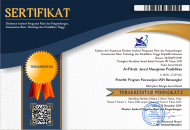Empowering Leadership In Employee Career Establishment (Case Study in East Java Banking)
Abstract
Keywords
Full Text:
PDFReferences
Sales force? An empirical examination of the influence of leadership empowerment behavior on customer satisfaction and performance. Journal of Applied Psychology, 90 (5), 945-955. DOI: 10.1037/0021- 9010.90.5.945.
Ahmad, A., and Gao, Y. (2017). Ethical leadership and work engagement: The roles of psychological empowerment and power distance orientation", Management Decision, https:// doi.org/10.1108/MD-02-2017-0107
Cheong, M., Yammarino, F. J., Dionne, S. D., Spain, S. M., & Tsai, C.-Y. (2019). A review of the effectiveness of empowering leadership. The Leadership Quarterly, 30(1), 34–58.
De Vos, A., De Hauw, S., & Van der Heijden, B. I. J. M. (2011). Competency development and career success: The mediating role of employability. Journal of Vocational Behavior, 79(2), 438–447.
Honold, L. (1997). A review of the literature on follower empowerment. Empowerment in Organizations, 5, 202–212. http://dx.doi.org/10.1108/14634449710195471
Jung, H.S. and Yoon, H.H. (2015),"The impact of employees’ positive psychological capital on job satisfaction and organizational citizenship behaviors in the hotel", International Journal of Contemporary Hospitality Management, Vol. 27 No.6 pp. 1135-1156.
Kim, M., Beehr, T.A. and Prewett, M.S. (2018), “Employee responses to empowering leadership: a meta-analysis”, Journal of Leadership and Organizational Studies, Vol. 25 No. 3, pp. 257-276.
Klagge, J. (1998). “The empowerment squeeze — views from the middle
management position.” Journal of Manage Development, Vol.17 No.7/8,
pp.548–59
Kundu, S.C., Kumar,S. and Gahlawat, N. (2019) "Empowering leadership and job performance: mediating role of psychological empowerment", Management Research Review, https:// doi.org/10.1108/MRR-04-2018-0183
Lei, C., Hossain, M. S., Mostafiz, M. I., & Khalifa, G. S. A. (2021). Factors determining employee career success in the Chinese hotel industry: A perspective of Job-Demand Resources theory. Journal of Hospitality and Tourism Management, 48, 301–311. doi:10.1016/j.jhtm.2021.07.001
Liden, R.C., Wayne, S.J., Liao, C. and Meuser, J.D. (2014), “Servant leadership and serving culture: influence on individual and unit performance”, Academy of Management Journal, Vol. 57 No. 5,pp. 1434-1452.
McMillan, C., O’Gorman, K.D., and MacLaren, A.C.(2011). “A vhicle for the Downloaded by Kansas State University At 08:05 01 October 2016 (PT) 27 sustainable empowerment of Nepali women”, International Journal of Contemporary Hospitality Management, Vol 23 No.2, pp.189-208
Namasivayam, K., Guchait, P., and Lei, P. (2014). “The influence of leader empowering behaviors and employee psychological empowerment on customer satisfaction”, International Journal of Contemporary Hospitality Management, Vol.26 No.1, pp.69-84
Saira.(2020)” Transformational leadership and employee outcomes: the mediating role of psychological empowerment”, Leadership & Organization Development Journal, 0143-7739 https://www.emerald.com/insight/0143-7739.htm
Seibert, S.E., Kraimer, M.L. and Crant, J. (2001), “What do proactive people do? A longitudinal model of linking proactive personality and career success”, Personnel Psychology, Vol. 54 No. 4, pp. 845-74
Spreitzer, G.M. (1995). Psychological empowerment in the workplace: Dimensions, measurement, and validation. Academy of Management Journal, 38, 1442–1465. http://dx.doi.org/10.2307/256865.
Spreitzer, G.M., Kizilos, M.A. and Nason, S.W. (1997), “A dimensional analysis of the relationship between psychological empowerment and effectiveness satisfaction, and strain”, Journal of Management, Vol. 23 No. 5, pp. 679-704.
Stander, M.W. and Rothmann, S. (2010), “Psychological empowerment, job insecurity and employee engagement”, South African Journal of Industrial Psychology, Vol. 36 No. 1, pp. 1-8.
Stumpf, S.A. (2014), “A longitudinal study of career success, embeddedness, and mobility of early career professionals”, Journal of Vocational Behavior, Vol. 85 No. 2, pp. 180-190
Thomas, K.W. and Tymon, W. (1994), “Does empowerment always work: understanding the role of intrinsic motivation and personal interpretation”, Journal of Management Systems, Vol. 6 No. 2, pp. 1-13.
Thomas, K.W., & Velthouse, B.A. (1990). Cognitive elements of empowerment: An “interpretive” model of intrinsic task motivation. Academy of Management Review, 15, 666–681. http://dx.doi.org/10.5465/AMR.1990.4310926.
Thun, S., & Bakker, A. B. (2018). Empowering leadership and job crafting: T he role of employee optimism. Stress and Health, 34(4), 573–581
Yan, H.K.N.S.Q. (2016),"New generation, psychological empowerment: can empowerment lead to career competencies and career satisfaction?", International Journal of Contemporary Hospitality Management, Vol. 28 Iss 11 pp
Zhang, I.D., Lam, L.W., Dong, L. and Zhu, J.N. (2020), “Can job-embedded employees Be satisfied? The role of job crafting and goal-striving orientations”, Journal of Business and Psychology, pp. 1-13, doi: 10.1007/s10869-020-09684-6
DOI: http://dx.doi.org/10.31958/jaf.v11i1.9487
Refbacks
- There are currently no refbacks.
Copyright (c) 2023 Evi Yulia, Nurus Safa’atillah

This work is licensed under a Creative Commons Attribution-NonCommercial 4.0 International License.
__________________________________________________________________________
 | Al-Fikrah: The Journal of Educational Management |
Creations are disseminated below Lisensi Creative Commons Atribusi-NonKomersial 4.0 Internasional.













